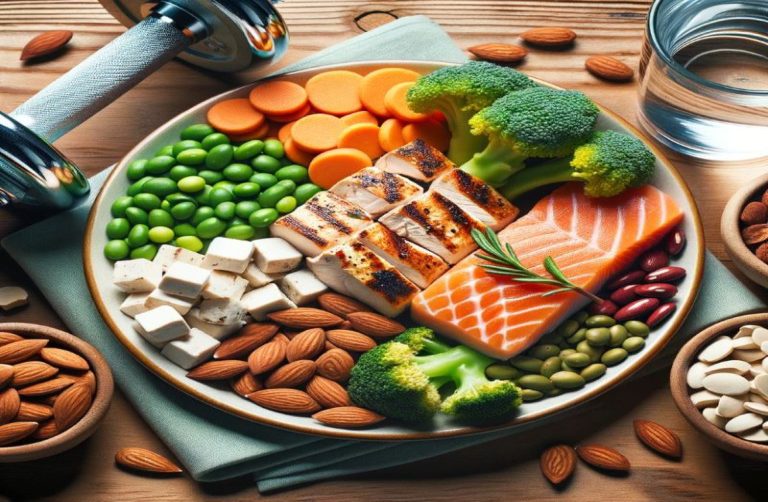The Science of Nutrition for Muscle Growth
Building muscle is a goal that many individuals aspire to, whether it’s for enhanced athletic performance, improved aesthetics, or simply to achieve better overall health. While the role of resistance training in muscle growth is well-understood, the importance of proper nutrition cannot be overstated. In fact, without the right nutrients, even the most rigorous workout regimen can fall short of yielding desired results. Let’s explore the vital role of “nutrition for muscle growth” and how you can optimize your diet to complement your workouts.
The Building Blocks: Protein
When it comes to nutrition for muscle growth, protein is often the first nutrient that springs to mind. And rightly so, as proteins are the primary building blocks of our muscles.
Role in Muscle Growth: After a strenuous workout, your muscles experience tiny tears. These tears are repaired by the body, leading to muscle growth. The repair process heavily relies on amino acids, the components of proteins.
Sources: Lean meats like chicken, turkey, and fish are excellent sources of protein. For vegetarians and vegans, lentils, chickpeas, quinoa, tofu, and tempeh are viable alternatives. Additionally, protein supplements like whey or plant-based powders can help in meeting daily requirements.
Recommended Intake: While individual needs may vary, a general recommendation is to consume between 1.2 to 2.2 grams of protein per kilogram of body weight, especially if you’re engaged in regular resistance training.
Carbohydrates: The Energy Providers
While carbs have been demonized in some diet circles, they are indispensable for those aiming for muscle growth.
Role in Muscle Growth: Carbohydrates are the primary energy source for our bodies. When you consume carbs, they’re broken down into glucose and stored in muscles and the liver as glycogen. During workouts, glycogen serves as a vital energy source. Adequate glycogen stores ensure optimal workout performance, allowing you to train harder and stimulate more muscle growth.
Sources: Opt for complex carbohydrates like whole grains, fruits, vegetables, and legumes. These not only provide sustained energy but also come packed with essential vitamins, minerals, and fibers.
Recommended Intake: Depending on activity levels, carbs should make up about 45-65% of total daily caloric intake.
Fats: The Essential Nutrient
Fats, particularly the right kind, play a crucial role in overall health and muscle growth.
Role in Muscle Growth: Fats are involved in the production of hormones, including testosterone, which is essential for muscle growth. They also serve as another source of energy, especially during prolonged exercises.
Sources: Avocados, nuts, seeds, olives, and fatty fish like salmon are great sources of healthy fats. These foods provide omega-3 and omega-6 fatty acids, which are essential for the body.
Recommended Intake: Aim for fats to constitute about 20-35% of your total daily caloric intake, with an emphasis on unsaturated fats.
Vitamins and Minerals
While macronutrients like proteins, carbs, and fats grab the limelight, micronutrients are equally vital for muscle health and recovery.
Vitamins like B6, B12, and D: These play roles in protein metabolism and the production of red blood cells, which deliver oxygen to exercising muscles.
Minerals like Calcium, Iron, and Zinc: Essential for muscle contraction, oxygen transport, and protein synthesis, respectively.
Ensure you’re consuming a varied diet rich in colorful fruits and vegetables, lean proteins, and whole grains to meet your micronutrient requirements.
Hydration
Muscles are about 70-75% water. Maintaining proper hydration is crucial for muscle function and recovery. Water aids in nutrient transport and can help alleviate muscle cramps. Aim to consume at least 3 liters (about 13 cups) for men and 2.2 liters (about 9 cups) for women per day, with additional intake during workouts.
Timing: The Anabolic Window
Post-exercise, there’s a period called the ‘anabolic window’ (typically up to two hours post-workout) where muscles are especially receptive to nutrients. Consuming a combination of proteins and carbs during this period can optimize muscle repair and growth.
Supplements
While whole foods should always be the primary source of nutrients, supplements can aid in filling the gaps. Some popular supplements in the context of muscle growth include:
- Creatine: Helps in regenerating ATP, the primary energy molecule, allowing for improved workout performance.
- Branched-Chain Amino Acids (BCAAs): Consisting of leucine, isoleucine, and valine, BCAAs can promote muscle protein synthesis and reduce muscle soreness.
However, always consult with a healthcare professional before incorporating any supplements into your regimen.
Conclusion
While resistance training is a critical component of muscle growth, the adage “you are what you eat” rings true here. In order to maximize your muscle growth, the proper nutrition is required. Good nutrition helps you build muscle much faster and gives you more energy to complete and stick to your workout routine. Consistency is key.
Free Muscle Building Secrets report
Subscribe to get your free Muscle Building Secrets report
Thank you for subscribing.
Something went wrong.
The form collects name and email so that we can add you to our newsletter list for project updates. Checkout our privacy policy for the full story on how we protect and manage your submitted data!


